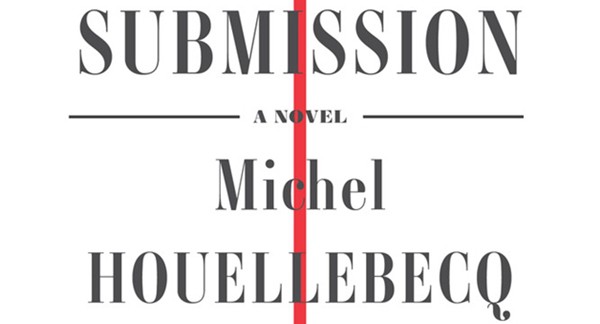Books & Culture
Life-in-progress: Submission by Michel Houellebecq

François, Michel Houellebecq’s narrator in his novel, Submission, is a middle-aged professor of literature at the Sorbonne III. His life is mostly devoid of meaningful human interaction, save for the students he sleeps with each year; his propensity for visiting YouPorn and prostitutes allows him his solitude while testing the strength of his libido. Houellebecq paints a picture of François’ mundane life: lecturing to disinterested students, microwaving TV dinners, and thinking constantly about the 19th century author Huysmans, François’ specialty and obsession. But François lives in the near-distant future, 2022, where France’s political system is in crisis. Following election tampering, France’s new Muslim party allies itself with the Socialists, and sweeps the presidential election. The result is France under religious law. Immediately, life changes drastically: women must be veiled, polygamy becomes legal, education is segregated by sex, and the Sorbonne is privatized. Jews flee to Israel. Non-Muslims — François included — lose their teaching positions. Houellebecq’s Submission is a work that defies characterization by one genre label, yet the author revels in exploring and exploiting fear.
Some have called Submission satire, others a dystopia. Is it a warning cry, a near-reality to be feared, or a conception of the darkest fears of the ignorant? The truth lies somewhere in between. Houellebecq himself — interviewed extensively following the novel’s now-infamous publication on the date of the Charlie Hebdo massacre — said in a September interview with The Guardian, “The role of a novel is to entertain readers, and fear is one of the most entertaining things there is.” Houellebecq’s work is emblematic — a re-spinning of — the fear-driven headlines that sell magazines and newspapers and keep TVs tuned to 24-hour news commentary. By distilling the traditionally hysterical language of news into the very plausible and mundane life of his narrator, Houellebecq forces his readers — of every ilk — to consider the effect of the stories we tell ourselves daily in 2015. Fear is a powerful seductress, and Houellebecq, with his description of a disconnected, academic life, understands that the most powerful way to explore something is to put it into the context of the ordinary.
Submission’s structure parallels its narrator’s obsession with Huysmans, the 19th century novelist who converted to Catholicism late in life, establishing the idea that there will be a conversion question for François. Houellebecq quotes En route in his invocation: “I am haunted by Catholicism,” Huysmans says, and thus is François haunted by Islam. Submission is rooted in just enough current history as to be plausible, though political events are secondary to the pedestrian detail and impotence of François’ life. He is surrounded by a cadre of academics and governmental workers, people that are happy to explain government, religion, and political change to him. Though some of these speeches border on overtly expository, they’re helpful in contextualizing the unrest in François’ world. François feels the changes of society, but only as inconveniences. “I was overcome by a feeling that everything would disappear,” he says at one point, yet when the stabilizing forces in his life — his girlfriend, or his job — do disappear, he carries on. “I was right where the Muslim candidate wanted me,” he says, “in a state of free-floating doubt. Not only did none of this sound scary, none of it sounded especially new.” François, who is not especially interested in history, who is not especially connected to any other people or any other immediate consequences of political upheaval, is Houellebecq’s analog for the unobservant masses. His life is not about anything particularly compelling, and yet he moves through change because it does not affect him enough. His life remains, both before and after the election, pretty much the same.
It is impossible, though, to discuss Submission without referencing its treatment of women. In her New York Times review, Rachel Donadio called Submission’s women “supine, in all senses of the word” — women in François’ life are subservient, unquestioning objects. “A woman is human,” he remarks, “obviously, but she represents a slightly different kind of humanity.” Whether Houellebecq’s (and François’) depiction of women as subservient is secondary, or central, to portraying François’ moral emptiness and disconnection is something readers will have to ask themselves. Several characters in the novel draw parallels to submissive relationships as exemplary of man’s relationship to God:
“‘It’s submission,’ Reidiger [François’ superior] murmured, ‘The shocking and simple idea, which had never been so forcefully expressed, that the summit of human happiness resides in absolute submission. I hate to discuss the idea with my fellow Muslims, who might consider it sacrilegious, but for me there’s a connection between woman’s submission to man […] and the Islamic idea of man’s submission to God.’”
Though the assertion of the male-female relationship as exemplary of man’s relationship to God is nothing new, taken in light of François’ dismissive and objectifying behavior — and ever-increasing penchant for using women — this is a more sinister argument. By the time this conversation occurs, late in the novel, François’ only use for women is in servitude to his basest needs. Houellebecq clearly means for us to consider how François uses women against the context of the new religious law — law which, consequently and without subtlety, subjugates women.
Houellebecq has said it’s not the content of Islam that concerns him, but the fear that surrounds it. Submission takes that fear and contextualizes it, and the fact that Houellebecq does this through the life of an unlikeable, disconnected, and misogynistic character makes it seem both ordinary and plausible. (Humans of every type are unlikeable, too.) Though Submission presents, at times, a dark view of humanity, and a skeptical view of established religion and government, Houellebecq’s provocative work asks important questions even as it offends. Submission is the kind of novel that spurs its reader to think critically. You should read this novel because it will disturb you.









